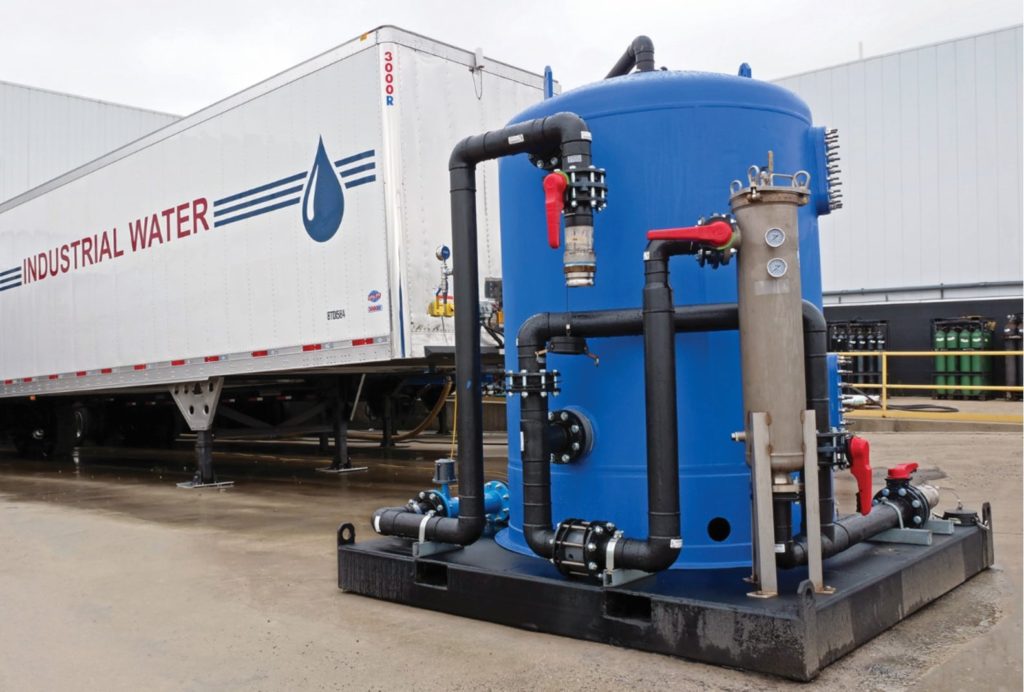
The Leader recently sat down with Justin Pierce, Director of Engineering & Manufacturing at MPW, to discuss the benefits of water filtration in industrial water-jetting processes, which represents a significant example of MPW divisions working in unison.
What different types of water sources does MPW use at job sites?
The water source depends on the site location and the customer’s routine operation. Typical sources include city water, clarified river water, well water and even fire-system water. In many cases the customer will have pretreated water which we then further refine with our industrial filtration systems. The type of filtration system needed varies depending on the water source, so it’s important to know a customer’s available water sources before starting a job.
What equipment does MPW use to filter water before it gets to the pumps?
We regularly use disposable cartridge filters. These are convenient options for smaller jobs but are ill-suited for high-volume filtration projects, which often exhaust more disposable cartridge filters than is practical.
No matter the scale of the project, the top priority in pretreating jetting water is to remove any total suspended solids (TSS). All pumps are outfitted with built-in TSS filters but prefiltration is often advised, especially when working with higher pressures. Typically, basic media filtration is the first line of defense against TSS because they’re easily deployed and economical. Carbon and multimedia filters are excellent options for this type of mechanical filtration.
Is this type of filtration standard in industrial cleaning or is MPW doing something different?
The water jetting industry does specify filtration standards based on pump type. Generally, the higher the pressure (psi) of the water jet, the higher the water quality requirement. The two are directly proportional because a small particle has the potential to do much more damage to the equipment at higher pressures.
What’s unique to MPW are the advantages afforded by its Industrial Water Division. The ability to keep all water jetting prefiltration services in-house not only makes for a seamless job execution, but also translates to less hassle and lower costs for the client.
What are the consequences of using unfiltered water?
Jetting with unfiltered water is a sure way to ruin equipment. When TSS in unfiltered water collide with nozzle tips, as well as pump valves and seats, the result is eroded equipment incapable of functioning at full capacity. This irreversible damage is known as “jetting out” and results in a permanent loss of pressure. Such equipment wears faster and must be replaced regularly. This is costly for both MPW and the client, who ultimately pays more for a less efficient job.
What are the benefits of using filtration?
The benefits of jetting with filtered water are obvious: filtered water protects against damage, which both prolongs the life of the equipment and preserves the pressure integrity. Both these factors contribute to increased efficiency across the board; higher water jetting pressures generally allow for quicker and more thorough cleanings.
What are some examples you’ve witnessed of using bad water?
Unfiltered or inadequately filtered water can ruin jetting technology, resulting in catastrophic pump failure or excessive downtime from filter clogging. Such damage results in costly downtime, as the equipment must be repaired or else changed out completely, not to mention the tens of thousands of dollars in damages and repairs.
What are specific advantages of using filtered water over both the short and long term?
MPW has been filtering its jetting water for years. It’s a simple practice that’s more than worth the effort. The benefits are all of a preventative nature: preserving the integrity of the equipment keeps repair/replacement costs down and also allows our clients to realize more of a profit.
What are the advantages to MPW clients?
MPW clients benefit from prefiltration practices primarily via maximized efficiency. Not having to change out filter bags and nozzle tips as often equates to decreased downtime on the job, not to mention the time saved by preventing total pump failure. A quicker job means that MPW’s clients can get their facility back to normal operations sooner, which is always our goal.
